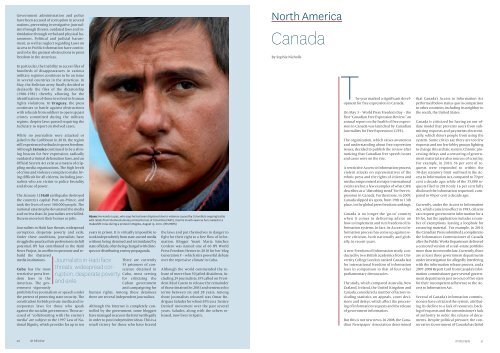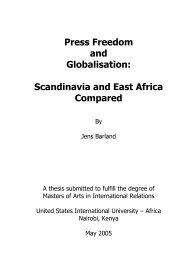FOCUS ON THE AMERICAS - International Press Institute
FOCUS ON THE AMERICAS - International Press Institute
FOCUS ON THE AMERICAS - International Press Institute
You also want an ePaper? Increase the reach of your titles
YUMPU automatically turns print PDFs into web optimized ePapers that Google loves.
Government administration and police<br />
have been accused of corruption in several<br />
nations, preventing investigative journalism<br />
through threats, outdated laws and intimidation<br />
through verbal and physical harassment.<br />
Political and judicial harassment,<br />
as well as neglect regarding Laws on<br />
Access to Public Information have continued<br />
to be the greatest obstructions to press<br />
freedom in the Americas.<br />
In particular, the inability to access files of<br />
hundreds of disappearances in various<br />
military regimes continues to be an issue<br />
in several countries in the Americas. In<br />
May, the Bolivian army finally decided to<br />
declassify the files of the dictatorship<br />
(1980-1981) thereby allowing for the<br />
identification of those involved in human<br />
rights violations. In Uruguay, the press<br />
continues to battle against obstructions<br />
with refusals from soldiers to open up past<br />
crimes committed during the military<br />
regime, despite laws passed requiring the<br />
Judiciary to report on shelved cases.<br />
While no journalists were attacked or<br />
jailed in the Caribbean in 2010, the region<br />
still experienced setbacks in press freedom.<br />
Although Jamaica continued to be a shining<br />
beacon for free expression, radically<br />
outdated criminal defamation laws, and an<br />
Official Secrets Act exist as a means of crippling<br />
media organizations. The high levels<br />
of crime and violence conspire to make living<br />
difficult for all citizens, including journalists<br />
who are victim to police brutality<br />
and abuse of power.<br />
The January 12 Haiti earthquake destroyed<br />
the country’s capital Port-au-Prince, and<br />
took the lives of over 300,000 people. The<br />
national catastrophe devastated the media<br />
and no less than 26 journalists were killed.<br />
Dozens more lost their homes or jobs.<br />
Journalists in Haiti face threats, widespread<br />
corruption, desperate poverty and exile.<br />
Under these conditions, journalists have<br />
struggled to practice their profession to its full<br />
potential. IPI has contributed to the Haiti<br />
News Project, in an effort to promote and rebuild<br />
the shattered<br />
media institutions.<br />
Cuba has the most<br />
restrictive press freedom<br />
laws in the<br />
Americas. The government<br />
vigorously<br />
prohibits free journalism or speech under<br />
the pretext of protecting state security. The<br />
constitution forbids private media and incorporates<br />
laws for those who speak<br />
against the socialist government. Those accused<br />
of “collaborating with the enemy’s<br />
media” are subject to the 1997 Law of National<br />
Dignity, which provides for up to ten<br />
20<br />
IPI REVIEW<br />
Journalists in Haiti face<br />
threats, widespread corruption,<br />
desperate poverty<br />
and exile.<br />
Above: Hernando Lopez, who says he has been displaced due to violence caused by Colombia's ongoing battle<br />
with rebels from the Revolutionary Armed Forces of Colombia (FARC), has his mouth sewn as he is nailed to a<br />
makeshift cross during a protest in Bogota, August 19, 2010. (REUTERS)<br />
years in prison. It is virtually impossible to<br />
work independently from state-owned media<br />
without being detained and intimidated by<br />
state officials, often being charged with disrespect<br />
or distributing enemy propaganda.<br />
There are currently<br />
55 prisoners of conscience<br />
detained in<br />
Cuba, most serving<br />
for criticizing the<br />
Cuban government<br />
and campaigning for<br />
human rights. Among these detainees<br />
there are several independent journalists.<br />
Although the Internet is completely controlled<br />
by the government, some bloggers<br />
have managed to access the Internet illegally<br />
in order to post independent ideas. This is a<br />
small victory for those who have braved<br />
the laws and put themselves in danger to<br />
fight for their right to a free flow of information.<br />
Blogger Yoani María Sánchez<br />
Cordero was named one of 60 IPI World<br />
<strong>Press</strong> Freedom Heroes in 2010 for her blog<br />
Generation Y – which stirs powerful debate<br />
over the repressive climate in Cuba.<br />
Although the world commended the release<br />
of more than 50 jailed dissidents, including<br />
29 journalists, IPI called on President<br />
Rául Castro to release the remainder<br />
of those detained in 2003 and sentenced to<br />
terms between six and 28 years. Among<br />
those journalists released was Omar Rodríguez<br />
Saludes for whom IPI ran a ‘Justice<br />
Denied’ movement over the past several<br />
years. Saludes, along with the others released,<br />
now lives in Spain.<br />
North America<br />
Canada<br />
By Sophie Nicholls<br />
The year marked a significant development<br />
for free expression in Canada.<br />
On May 3 – World <strong>Press</strong> Freedom Day – the<br />
first “Canadian Free Expression Review,” an<br />
annual report on the health of free expression<br />
in Canada was launched by Canadian<br />
Journalists for Free Expression (CJFE).<br />
The organization, which raises awareness<br />
and understanding about free expression<br />
issues, decided to publish the review after<br />
noticing that Canadian free speech issues<br />
and cases were on the rise.<br />
A restrictive Access to Information process,<br />
violent attacks on representatives of the<br />
ethnic press and the rights of citizens and<br />
media compromised at major international<br />
events are but a few examples of what CJFE<br />
describes as a “disturbing trend” for free expression<br />
in Canada. Furthermore, in 2009,<br />
Canada slipped six spots, from 19th to 13th<br />
place, in the global press freedom rankings.<br />
Canada is no longer the ‘go-to’ country<br />
when it comes to delivering advice on<br />
how to implement and run Freedom of Information<br />
systems. In fact, its Access to Information<br />
process has come up against severe<br />
criticism, both nationally and globally,<br />
in recent years.<br />
A new Freedom of Information study, conducted<br />
by two British academics from University<br />
College London, ranked Canada last<br />
for international freedom of information<br />
laws in comparison to that of four other<br />
parliamentary democracies.<br />
The study, which compared Australia, New<br />
Zealand, Ireland, the United Kingdom and<br />
Canada, considered a number of factors including<br />
statistics on appeals, court decisions<br />
and delays, which affect the processing<br />
of information requests and the release<br />
of government information.<br />
But this is not new news. In 2008, the Canadian<br />
Newspaper Association determined<br />
that Canada’s Access to Information Act<br />
performed below status quo in comparison<br />
to other countries, including its neighbor to<br />
the south, the United States.<br />
Canada is criticized for having an out-ofdate<br />
model that prevents users from submitting<br />
requests and payments electronically,<br />
which deters people from using the<br />
system. Some critics say there are too few<br />
requests and too few lobby groups fighting<br />
to change this archaic system. Chronic processing<br />
delays and a censoring of government<br />
material are also sources of scrutiny.<br />
For example, in 2010, 56 per cent of requests<br />
were responded to within the<br />
30-day statutory limit outlined in the Access<br />
to Information Act, compared to 70 per<br />
cent a decade ago; while of the 35,000 requests<br />
filed in 2010 only 16 per cent fully<br />
disclosed the information requested, compared<br />
to 40 per cent a decade ago.<br />
Currently, under the Access to Information<br />
Act, which came into effect in 1983, citizens<br />
can request government information for a<br />
$5 fee, but the application includes a number<br />
of exemptions, leaving a loophole for<br />
censoring material. For example, in 2010,<br />
the Canadian <strong>Press</strong> submitted a complaint to<br />
the Information Commissioner of Canada<br />
after the Public Works Department delivered<br />
a censored version of a real-estate portfolio<br />
more than two months late. Currently, there<br />
are at least three government departments<br />
under investigation for allegedly interfering<br />
with the information release process, and a<br />
2007-2008 Report Card from Canada’s information<br />
commissioner gave several government<br />
departments just two out of five stars<br />
for their incompetent adherence to the Access<br />
to Information Act.<br />
Several of Canada’s information commissioners<br />
have criticized the system, attributing<br />
its decline to a lack of resources, backlog<br />
of requests and the commissioner’s lack<br />
of authority to order the release of documents.<br />
Despite political pressure, the conservative<br />
Government of Canada has failed<br />
IPI REVIEW<br />
21

















